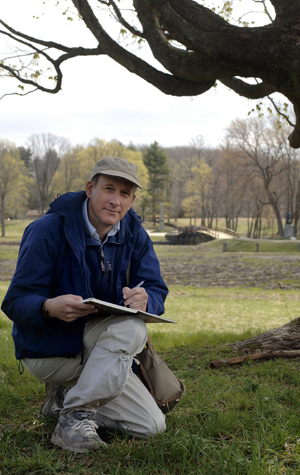Early Spring Flowering Sets Record
CAS study: climate change speeding, but not preventing, blooms

Richard Primack has found new evidence that climate change is causing flowering plants in Massachusetts to bloom earlier than ever, but wonders how far they can be pushed. Photo by Cydney Scott
The truth is, April showers do not bring May flowers; long cold winters do, at least when it comes to some species that flourish in the New England woods. That’s what concerns conservation biologists like Richard Primack, who worries that the trend toward shorter and warmer winters could play havoc with mechanisms that tell plants when to bloom and could eventually forestall any bloom at all. In a new study, Primack, a College of Arts & Sciences professor of biology, and postdoctoral researcher Elizabeth Ellwood (GRS’12) demonstrate that while those flowers are blooming earlier than ever, at least they are still blooming.
“In 2010 and 2012, plants in Massachusetts flowered earlier than recorded in any year since 1852,” says Ellwood. “We have not found evidence that plants have reached a physiological threshold beyond which they cannot respond to warming temperatures.”
Primack and his team have been chronicling the dates that flowering plants bloom around Walden Pond for several years and comparing their observations with those made by Henry David Thoreau in the mid-19th century. His most recent research, done with Ellwood, Charles Davis at Harvard University, and Stanley Temple at the University of Wisconsin, also studied data collected since 1935 by Aldo Leopold in Sand County, Wis. That new study, published in the open-access journal PLOS ONE, shows that many plants—such as highbush blueberry and pink lady’s slipper orchid—flowered up to 4.1 days earlier for every degree Celsius rise in mean spring temperatures. It also showed that the historical patterns of early flowering in warm years and later in cold years can predict flowering times even in exceptionally warm years. And it found that wildflowers just keep flowering earlier as the climate warms.

“In 2010, plants flowered three weeks earlier than in Thoreau’s time, and we thought we’d never see another year like that,” says Primack. “But then two years later we had another record early flowering year, both in Massachusetts and in Wisconsin.”
Still, Primack wonders how far nature can be pushed before there are no blooms at all. “These plants have shown remarkable resilience over decades of changing weather,” he says. “But it is unknown whether plant flowering times will continue on a linear trajectory of earlier flowering, or if at some point plants instead will be unable to keep pace with climate change.”
Ellwood points out that even if the flowers are still blooming, the timing of their blooms can have implications at the ecosystem level.
“Spring plant growth indicates the start of the growing season and will influence ecosystem processes such as nutrient cycling and carbon sequestration,” she says. “Interactions with animals will also be impacted as herbivores depend on spring plant growth and pollinators rely on open flowers. The timing of when plants and animals begin spring activity can be altered by temperature to varying degrees, and there is still much to understand about how temperature extremes will affect different organisms.”
In another project, Primack looked at how the warming trend alters the ability of trees and plants to absorb carbon dioxide from the atmosphere. The intuitive effect—trees would grow better as warmer temps stretch out the growing season, allowing them to vacuum more CO2 from the atmosphere—may not happen: a longer, warmer growing season could decay more material on the forest floor, which might, in turn, lead to more CO2 in the atmosphere, he says.
Left unchecked, Primack says, a warming planet will “reach a point at which the ecosystems are going to start to fail—there won’t be enough trees, there won’t be enough birds and insects in the systems. They’re not going to be absorbing enough carbon dioxide. They’re not going to be absorbing the waters to prevent flooding. They’re not going to be creating soil.”

Comments & Discussion
Boston University moderates comments to facilitate an informed, substantive, civil conversation. Abusive, profane, self-promotional, misleading, incoherent or off-topic comments will be rejected. Moderators are staffed during regular business hours (EST) and can only accept comments written in English. Statistics or facts must include a citation or a link to the citation.